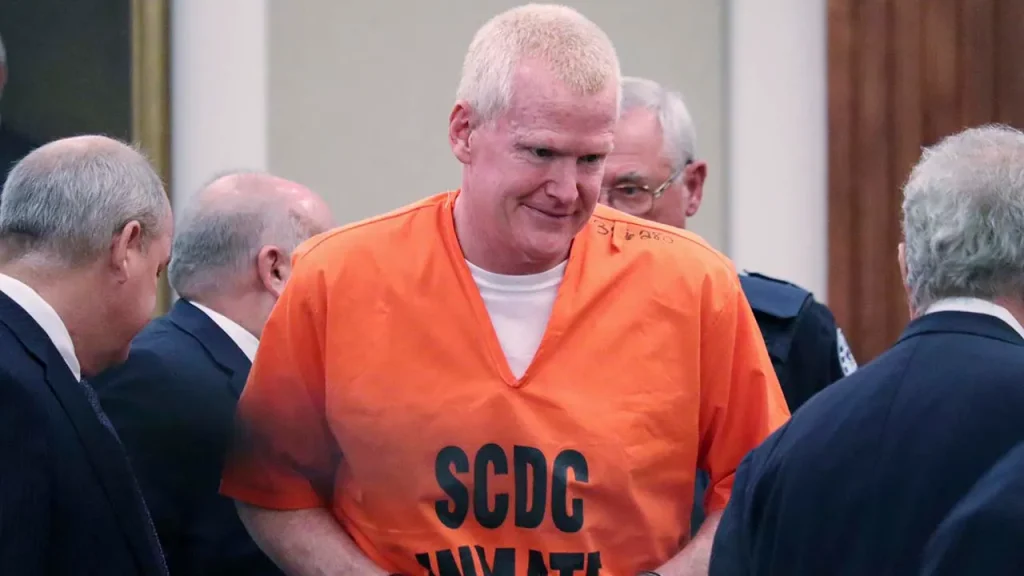The Rise and Fall of Alex Murdaugh: A Dynasty’s Dark Collapse
The shocking saga of Alex Murdaugh—once a respected South Carolina legal powerhouse—continues to captivate public attention years after his conviction for double murder. Recently reimagined in Hulu’s eight-part series “Murdaugh: Death in the Family,” this true crime story reveals how a single 911 call on June 7, 2021, would ultimately expose decades of deception perpetrated by a man who seemed untouchable. That fateful evening, Murdaugh reported finding his wife Maggie and younger son Paul shot to death on their sprawling Lowcountry estate. What initially appeared to be a tragic double homicide eventually unraveled as something far more sinister: the desperate actions of a man whose carefully constructed life of privilege was collapsing around him.
For generations, the Murdaugh name carried immense weight throughout South Carolina’s legal community. Alex leveraged this legacy to build his own power and influence, becoming a formidable figure whose connections seemed impenetrable. As attorney Mark Tinsley, who testified against Murdaugh, observed: “I think there’s probably a group of people that still find it hard to believe that the facade that they saw wasn’t real.” This facade began showing cracks years before the murders, when the family’s longtime housekeeper Gloria Satterfield mysteriously died after falling at the Murdaugh home in 2018. Then in 2019, Alex’s son Paul was involved in a boating accident that killed 19-year-old Mallory Beach, leading to a wrongful death lawsuit against the family and criminal charges against Paul. These incidents, while concerning, were merely glimpses of the darkness that lurked beneath the Murdaugh family’s veneer of respectability.
The investigation into Maggie and Paul’s murders quickly exposed inconsistencies in Alex’s account of that night. Though he initially claimed he wasn’t at the kennels where they were killed, a Snapchat video recorded by Paul proved otherwise. Murdaugh’s desperation became increasingly apparent in September 2021 when he orchestrated his own shooting in a botched suicide-for-insurance scheme, hoping to secure a $10 million payout for his surviving son Buster. The plot failed spectacularly when his accomplice, Curtis Edward Smith, merely grazed his head with a bullet. This bizarre incident accelerated the scrutiny into Murdaugh’s affairs, with investigators soon discovering a staggering pattern of financial crimes spanning decades.
It was the Satterfield case that ultimately became the thread that unraveled Murdaugh’s entire web of deception. Authorities discovered he had stolen $4.3 million in insurance settlement funds intended for the deceased housekeeper’s family—a revelation that opened the floodgates to other financial crimes. “I knew that he had done some things that were not necessarily above board in the way [the Satterfield case] was handled,” Tinsley reflected, “But it turned out it was a lot worse than what I had thought it was.” Murdaugh was arrested in October 2021 at a Florida drug rehabilitation facility on charges related to defrauding the Satterfield family. Within weeks, prosecutors added 27 new charges, alleging that Murdaugh had misappropriated nearly $5 million from various clients and victims to fuel his opioid addiction.
The full extent of Murdaugh’s crimes continued to mount in the months leading up to his murder indictment. By the time he was formally charged with killing Maggie and Paul in July 2022, prosecutors had amassed overwhelming evidence of his financial misconduct alongside the murder investigation. This dual track of criminality painted a picture of a man who had maintained his status and addiction through decades of theft from vulnerable clients, including grieving families who had trusted him with their legal matters. The ensuing trial captivated the nation, with Murdaugh’s testimony in his own defense proving particularly damaging. His attempts to explain away evidence often contradicted established facts, and jurors later reported his demeanor on the stand contributed significantly to their guilty verdict.
The fall of Alex Murdaugh represents more than just one man’s crimes—it marks the collapse of a legal dynasty that controlled its corner of South Carolina for generations. Now serving two consecutive life sentences for the murders, plus an additional 40 years for his financial crimes, Murdaugh remains in maximum-security confinement with his appeals facing significant challenges. His downfall serves as a stark reminder of how power and privilege can mask depravity for decades. As Tinsley observed, “I think that overall, most people get it. Most people understand, and most people see through his web of lies and deception.” The Murdaugh saga continues to resonate because it explores universal themes of betrayal, addiction, and the corrupting influence of unchecked power—revealing how someone so deeply entrenched in the justice system could so thoroughly subvert it for personal gain, ultimately destroying everything and everyone he claimed to love.


